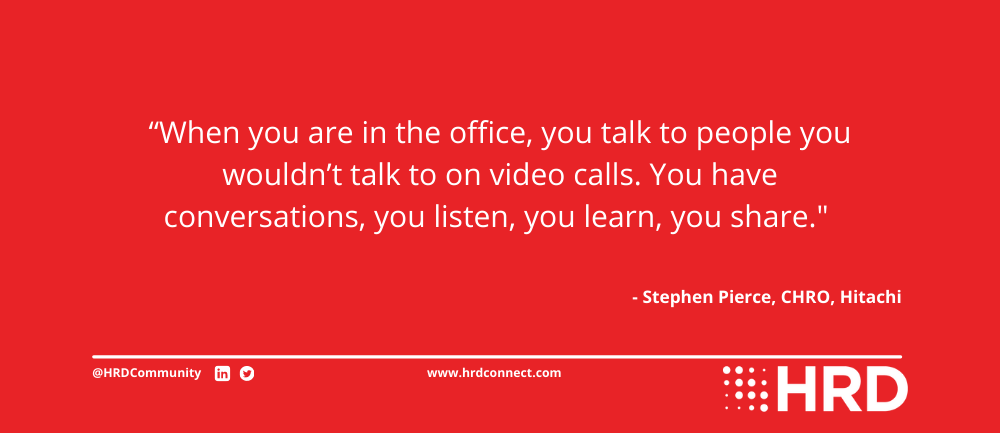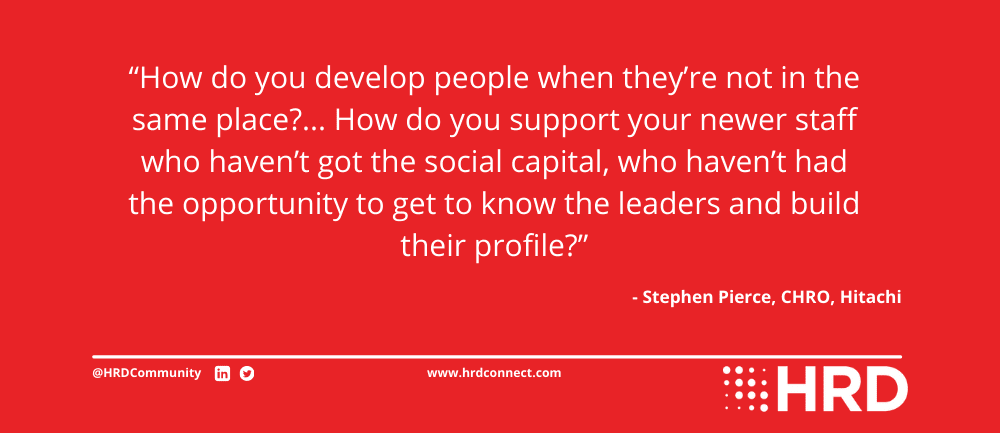-
Provided by

- Date published: Feb 18, 2022
- Categories
Hitachi, the global technology brand headquartered in Tokyo, has always operated from a simple mission: to contribute to society through innovation.
And with impressive decarbonisation plans and a climate change agenda to focus on, it’s fair to say that Hitachi has big plans for the future. That’s why Hitachi is shaking things up this year with their hybrid working plan.
We speak to Stephen Pierce, CHRO at Hitachi, on what they’re doing to create a culture of inspiration and purpose, and a collaborative, purpose-based office to support it.
Purpose and presence
We know that HR has been pivotal over the last two years, managing everything from talent and culture to mental health and wellbeing. Now, businesses are turning to HR to map out their hybrid working strategies.
“Hybrid working is an area in which HR can bring its expertise and experience to say, ‘actually, how do you ensure that your people are able to work effectively in the situation that you’re in?’ says Stephen.
From Hitachi’s point of view, Stephen knows they are in a beneficial position because they can work remotely quite easily. Most of the staff are not required to be in the office or in one location, which means the business has been able to drive the message that people can work where it makes most sense to work.
That doesn’t mean anywhere in the world, though. The model set out by Hitachi offers flexibility as many others do, but is supported by the notion of being present in the office for a specific purpose, for at least one day a week.
“And that’s where the purpose piece really comes in,” explains Stephen. “Don’t come into the office on a Tuesday, come in because there’s a purpose to come in on a Tuesday.”

What that looks like for each individual varies; whether it’s to be together as a team, for training, to collaborate on a project or just for a one-to-one meeting.
For Stephen, building a purpose behind visiting the office will help drive presence, and vice versa. This, in turn, will encourage staff to familiarise themselves with the office again.
But while the idea seems solid on the surface, Stephen cautions against the misuse of it.
“People’s purpose varies drastically, so it’s important to strike the right balance.”
It’s also important to note that deciding on one day a week that works for an entire team will come with logistical difficulties, particularly when Hitachi wants to embed flexibility of choice into the core of their hybrid model.
As such, Hitachi are encouraging people leaders to work out the right solution with their team.
“We’re really asking everybody to work it through with their own teams to find the right solutions. Obviously people have other commitments and we want to respect that,” says Stephen.
“But ultimately we’ve got to get back to being together some of the time, so the approach is ‘let’s work on this collaboratively.’”
This collaborative cycle of presence drives purpose is also seen in the way the business communicates. While Teams and Zoom have supported connection over the last two years, they can often encourage silos.
Now, as we step out of our houses, Hitachi wants to reignite that informal communication across the organisation – the chats in hallways and office kitchens. Although small, they play a monumental part in both repairing and creating connections.
“When you are in the office, you talk to people you wouldn’t talk to on video calls. You have conversations, you listen, you learn, you share,” says Stephen.
Stephen also stresses the importance of trust if Hitachi are to strike the right balance in their hybrid purpose model. If the business is too heavy handed in this transition, they risk losing people.
“If we’ve trusted people to do the right thing through Covid, we need to trust them to do the right thing coming out of Covid – to recognise that they do need to be in [the office] for these reasons.”
But for this hybrid model to go as well as Hitachi hopes, the importance of effective leadership and communication cannot be overlooked.
“We are in uncharted waters and people need some direction and they need leadership,” says Stephen.
“Because they’re disconnected. They can’t bump into someone and have a conversation. They need their manager to connect with them.”
For HR, this means encouraging leaders to connect with their team. As a result, Hitachi have implemented leadership training to ensure those people feel equipped to drive those conversations on their level.

Innovation and collaboration
“We haven’t stopped innovating and collaborating while we’ve been remote working,” says Stephen. “It has happened. The question is, has it happened as well as it would have done if we were together more often?”
It’s the million dollar question for businesses at the moment, and one that will never have a simple and solid answer.
For Hitachi, working together physically offers more opportunity to work synchronously; sharing ideas and thoughts that naturally turn the wheels of imagination. For a company that embodies innovation, this is far more favourable than a permanent remote situation.
And despite the benefits of asynchronous, remote work, Stephen believes that the restrictions it has on free flowing communication can be detrimental to individual and business growth in the long-term.
This can be seen through Hitachi’s work as a principal partner to the COP26 conference in Glasgow last year.
“A number of our colleagues were working on that, which meant they needed to get together face-to-face. It made sense to be together… to talk through how we maximise both the value for Hitachi but also the contribution to COP26,” says Stephen.
“You need to be together because ultimately the event is an in-person event.”

But circling back to balance, Stephen stresses that COP26 is an example where it was critical to be together. Similarly, there will be many occasions where it makes sense to stick to remote.
International travel is one such example, particularly for a business heavily invested in decarbonisation and sustainability.
“Obviously there are challenges getting together for a global company. Typically we would fly long-haul to meet together,” says Stephen.
“But with the challenges of decarbonisation and Hitachi saying we will be carbon neutral in our factories and in our offices by 2030, the question is ‘should you travel as much?’”
This is an issue many companies are beginning to face as the world reopens. And for a business committed to climate change, decisions on what are necessary and unnecessary – particularly after two years of successful remote work – are delicate.
Challenges also exist in other areas as well, including L&D and how important that is for the growth of talent at Hitachi.
“How do you develop people when they’re not in the same place?” asks Stephen.
“How do you support your newer staff who haven’t got the social capital, who haven’t had the opportunity to get to know the leaders and build their profile?”

Similarly D&I is difficult to manage when people can’t connect in person.
“On one hand it can be more flexible for people, but on the other hand… people are less visible and therefore may get less opportunity.”
When finding the solution, Hitachi understands that it takes time and – again – balance. The solutions Stephen believes are best to follow are below.
“The first step is to be aware of the issue,” begins Stephen. “Because you can’t respond to something unless you know it’s there.”
“Secondly, recognising one answer doesn’t apply to everybody is very important.”
“And thirdly, engaging and involving others to find the solutions. Nobody has a monopoly or wisdom on these areas, particularly as it’s unchartered territory.”
The above challenges and solutions all seem to point towards the path Hitachi are taking, which is working collaboratively in-person to overcome issues and continue to innovate together as one organisation.

Leading with humanity
As Hitachi now moves further in 2022, it wants to continue to support its people the best way possible. For Stephen, that responsibility sits with both leadership and HR.
“The role of managers and HR is to create hope,” says Stephen. “When times are tough, people need hope. They need to know we’ll get through this.”
“And when people have purpose, they tend to have hope. And that also depends on having direction and strategy and an understanding of where it is you’re going.”
Hitachi runs a global survey to get a perspective of what their people are thinking and feeling. And while last year saw the best results Hitachi had ever had, despite being in the middle of the pandemic, Stephen wants to beat it this year.
“It just shows that when times are tough, it doesn’t necessarily mean people are more negative. In fact, when the company steps up, it can actually make the culture stronger,” explains Stephen.
But it’s important to note that this can’t be driven solely by HR. The power of creating a strong company culture that can drive innovation and purpose relies on collaboration across all levels. That means HR working in tandem with other business leaders to reach and drive decisions.
“The collaboration we’ve seen in the last year or so has probably made it easier to get things done [for HR],” says Stephen.
‘Collaboration means buy-in, and buy-in generally means you get a more decisive approach.”
As Stephen leads Hitachi’s people further in 2022, he has a lot on his plate. But driving Hitachi’s purpose-led office and supporting people through this transition is a top priority for now.
“We’ve got to get people uncomfortable again for the success of business and the wellbeing of our staff,” explains Stephen.
Despite the overall goal of enticing people out of their comfort zone, Hitachi are determined to do it the right way and at the right pace. Although this will take time, offering the right balance and freedom to staff means the purpose-based office will continue to transform into a place that boosts engagement, innovation and collaboration.
